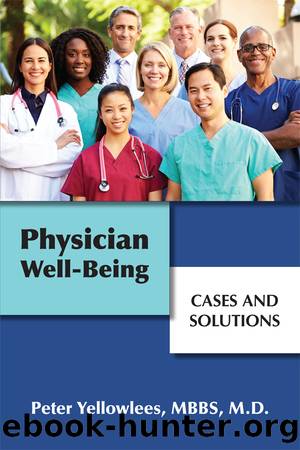Physician Well-Being by Yellowlees Peter;

Author:Yellowlees, Peter;
Language: eng
Format: epub
Publisher: American Psychiatric Association Publishing
Published: 2019-08-15T00:00:00+00:00
Commentary
Three major themes of this scenario are important. First, what strengths or evidence of resilience and motivation do schools look for in applicants that will ensure chosen students have long-term success as physicians? The corollary is what, therefore, do students have to demonstrate to obtain admission to medical school? A related issue is how can students carefully curate their online presence and their offline resume over several years to ensure that they minimize possible âred flagsâ that might obstruct their admission?
Second, what programs do medical schools have to support the well-being of their students? We know from the research of Brazeau et al. (2014) that, at entry to medical school, medical students are more resilient than age- and gender-matched nonmedical graduate students. Yet within 2 years they have higher rates of depression and burnout than equivalent control subjects, and these high rates persist throughout residency and for at least 5 years beyond (Dyrbye et al. 2014). What goes wrong, and how can this be prevented?
Third, despite Luisâs obvious motivation and intelligence and his demonstrated capacity to overcome adversity, it is evident that he is someone who is vulnerable to becoming burned out or psychiatrically ill in the future. He may need extra support and help during his training as well as later on in his career. How do we know this? Luis has a strong genetic predisposition to depression, through his fatherâs suicide, his motherâs likely chronic depression (and diabetes as a second chronic illness), and his own possible recent episode of depression. Just as importantly, he has a background characterized by adverse childhood experiences (ACEs), which we know are related to an increased risk of poor mental and physical health outcomes in adulthood. Were he to take it, Luis would score more than 4 on the ACE Scale (Gilbert et al. 2015) as a consequence of his traumatic childhood. This cutoff score is associated strongly with the likelihood of the eventual development of chronic medical and psychiatric disorders in adulthood. In summary, Luis is vulnerable both biologically or genetically and from a lifestyle and experiential perspective. What are the implications of this for his future career as a physician despite his capacity to successfully jump the high bars related to medical school admission?
Download
This site does not store any files on its server. We only index and link to content provided by other sites. Please contact the content providers to delete copyright contents if any and email us, we'll remove relevant links or contents immediately.
The Art of Thinking Clearly by Rolf Dobelli(9915)
The 5 Love Languages: The Secret to Love That Lasts by Gary Chapman(9281)
Mindhunter: Inside the FBI's Elite Serial Crime Unit by John E. Douglas & Mark Olshaker(8702)
Becoming Supernatural by Dr. Joe Dispenza(7836)
The Road Less Traveled by M. Scott Peck(7279)
Nudge - Improving Decisions about Health, Wealth, and Happiness by Thaler Sunstein(7244)
Mastermind: How to Think Like Sherlock Holmes by Maria Konnikova(6937)
Enlightenment Now: The Case for Reason, Science, Humanism, and Progress by Steven Pinker(6874)
Win Bigly by Scott Adams(6828)
The Way of Zen by Alan W. Watts(6289)
Factfulness: Ten Reasons We're Wrong About the World – and Why Things Are Better Than You Think by Hans Rosling(4487)
The State of Affairs by Esther Perel(4485)
Gerald's Game by Stephen King(4376)
Man's Search for Meaning by Viktor Frankl(4275)
The Confidence Code by Katty Kay(4040)
Thinking in Bets by Annie Duke(3997)
The Worm at the Core by Sheldon Solomon(3325)
Hidden Persuasion: 33 psychological influence techniques in advertising by Marc Andrews & Matthijs van Leeuwen & Rick van Baaren(3292)
Enlightenment Now by Steven Pinker(3273)
